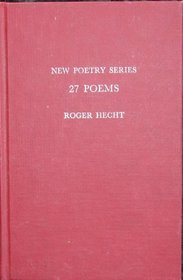 Book: 27 Poems (1966)
Book: 27 Poems (1966)The Swallow Press, Chicago
Author: Roger Hecht
ISBN: PS 3558. E3. T9 1966
Available for Checkout at the Zuhl Library at NMSU
Speaking of svelte, although not quite as trim as Piero Heliczer's aforementioned staple-bounder, Roger Hecht's 27 Poems delivers its goods with the spine girth of a Vincent Price mustache. But hey, big things small packages, yada yada yada. Seriously though, Hecht's 1966 debut collection is worth a look.
Poems often feature egos meeting a riptide of concern involved with positioning one's self in relation to other forces, whether those be natural or societal. Hecht sanctifies the former creating a familiar Romantic binary, but his speakers never quite hug the sublime. Like Timothy Donnelly's Explanation of an Oriole, nature is often a visiting salve that lights on the speaker and then flies away, not a purifying alembic for consciousness. Then again, there are poems within the collection that might contradict this interpretation, like "Summer's End" for instance. So, grain of salt. However, it's hard to disagree with Hecht's preoccupation with circumscribing the external forces that harry the individual; many poems like the long narrative "The Last Crusade" feature the speaker engaging other psychologies beset by the same problem. In "The Last Crusade" the speaker throws in with Woodrow Wilson, speculating on how he dealt with his position as President and as arbiter of the U.N.'s formation. There are a few telling lines to that end in the poem on page 57:
"Everything is persistently impersonal. I am administering
a great office, but I do not seem to be identified with it:
it is not me and I am not it. This impersonality of my
life is a very old thing, and perhaps robs it of intensity
Overall, Hecht's 27 Poems is a nice (and quick) read. However, if you're looking for anything experimental or out of the ordinary, I wouldn't suggest it. The collection's very tame, in many ways, old fashioned even. My friend and fellow poet, Jennifer Eldridge, who's always concerned with trashing adjectival modification should stay away from this one. But if you're itching for something that sounds great when read aloud, Hecht's work might be for you I'm interested in the way Hecht uses the word "boredom" in the collection--shades of Baudelaire or Dostoevsky, maybe. But I wasn't able to tie any kind of knot between them.
-Paul French
No comments:
Post a Comment